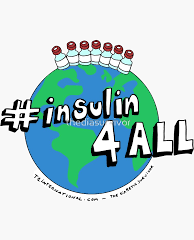Type 1 Diabetes (T1D) is often viewed through the lens of physical health—blood sugar levels, insulin dosages, and carbohydrate counting. However, one critical aspect that is frequently overlooked is its impact on mental health. The constant management, unpredictability, and societal misunderstandings about T1D can take a significant toll on a person’s emotional well-being. Understanding and addressing these mental health challenges is essential for overall health and quality of life.
The Emotional Burden of Type 1 Diabetes
Living with T1D requires 24/7 vigilance. Unlike other conditions where treatment may be occasional, diabetes demands constant monitoring and adjustments. Every meal, physical activity, illness, and even stress can affect blood sugar levels. This relentless responsibility can lead to a variety of mental health challenges, including stress, anxiety, depression, and burnout.
Diabetes Distress
Diabetes distress is a term used to describe the overwhelming feelings of frustration, worry, and exhaustion that come with managing T1D. It is different from clinical depression, but the symptoms can be similar. People experiencing diabetes distress may feel like they are failing in their management, become emotionally drained, or start neglecting their diabetes care altogether.
Anxiety and Fear of Hypoglycemia
Many people with T1D experience anxiety, especially related to the fear of hypoglycemia (low blood sugar). Hypoglycemia can cause dizziness, confusion, seizures, or even unconsciousness, making it a terrifying experience. The fear of going too low can lead to people running their blood sugar levels higher than recommended, which increases the risk of long-term complications.
Depression and Diabetes Burnout
Studies show that people with diabetes are two to three times more likely to experience depression than those without diabetes. Managing T1D is an exhausting lifelong commitment, and at times, individuals may feel hopeless or overwhelmed. Diabetes burnout occurs when someone becomes so mentally and emotionally drained by their condition that they disengage from their care. They may stop checking their blood sugar, skip insulin doses, or avoid medical appointments. This can be dangerous, as neglecting diabetes care can lead to severe complications.
Strategies for Managing Mental Health with T1D
1. Seek Professional Support
If you’re struggling with diabetes distress, anxiety, or depression, seeking help from a mental health professional—especially one with experience in chronic illnesses—can be incredibly beneficial. Therapy can provide coping strategies, emotional support, and tools to navigate the mental health challenges that come with T1D.
2. Build a Support System
No one should go through T1D alone. Connecting with others who understand the daily challenges can make a significant difference. Support groups, online communities, and diabetes advocacy organizations provide a space to share experiences, tips, and encouragement. Family and friends can also play a crucial role, but it’s important to educate them about the realities of T1D so they can provide the right kind of support.
3. Practice Mindfulness and Stress Management
Stress has a direct impact on blood sugar levels, making stress management a crucial aspect of diabetes care. Practices like meditation, deep breathing exercises, and yoga can help reduce stress and improve emotional well-being. Mindfulness techniques can also assist in staying present and reducing anxiety related to blood sugar fluctuations.
4. Set Realistic Goals and Be Kind to Yourself
Perfection in diabetes management is impossible. Blood sugar levels will fluctuate, and unexpected highs and lows will happen. Instead of striving for perfection, focus on progress and making the best decisions in the moment. Being kind to yourself and recognizing that you are doing your best can alleviate some of the mental strain.
5. Use Technology to Reduce the Burden
Advancements in diabetes technology, such as continuous glucose monitors (CGMs) and insulin pumps, can help reduce some of the mental load of managing T1D. These tools provide real-time data, reduce the need for constant finger pricks, and offer alerts for potential highs and lows, giving individuals more peace of mind.
6. Engage in Physical Activity
Exercise is beneficial not only for blood sugar management but also for mental health. Physical activity releases endorphins, which improve mood and reduce stress. Even light activities such as walking, stretching, or dancing can help boost mental well-being.
7. Communicate with Your Healthcare Team
Your healthcare team should be a source of support, not stress. If you are feeling overwhelmed, let them know. Endocrinologists, diabetes educators, and mental health professionals can work together to create a plan that considers both physical and mental well-being. If your current healthcare provider is not supportive, seek a second opinion or look for someone who better understands your needs.
Breaking the Stigma Around Diabetes and Mental Health
One of the biggest barriers to mental health support in the diabetes community is the stigma surrounding both conditions. There is often an expectation for people with T1D to be “strong” and manage their diabetes without complaints. Similarly, mental health struggles are sometimes dismissed or minimized.
Raising awareness about the mental health challenges of T1D is essential. Open conversations, education, and advocacy can help break down the stigma and ensure that individuals receive the support they need. The more we talk about the mental side of diabetes, the more we normalize seeking help and prioritizing emotional well-being.
Final Thoughts
Managing Type 1 Diabetes is a full-time job—one that comes with emotional ups and downs. While the physical aspects of diabetes management are essential, addressing mental health is just as crucial. If you or someone you know is struggling, remember that you are not alone. There is support available, and seeking help is a sign of strength, not weakness.
By prioritizing mental health, using available resources, and leaning on a supportive community, people with T1D can lead fulfilling, balanced lives despite the challenges. Let’s continue to break the silence and advocate for better mental health support in the diabetes community.
Have you experienced mental health challenges related to Type 1 Diabetes? Share your thoughts in the comments or connect with us on social media!



0 Comments